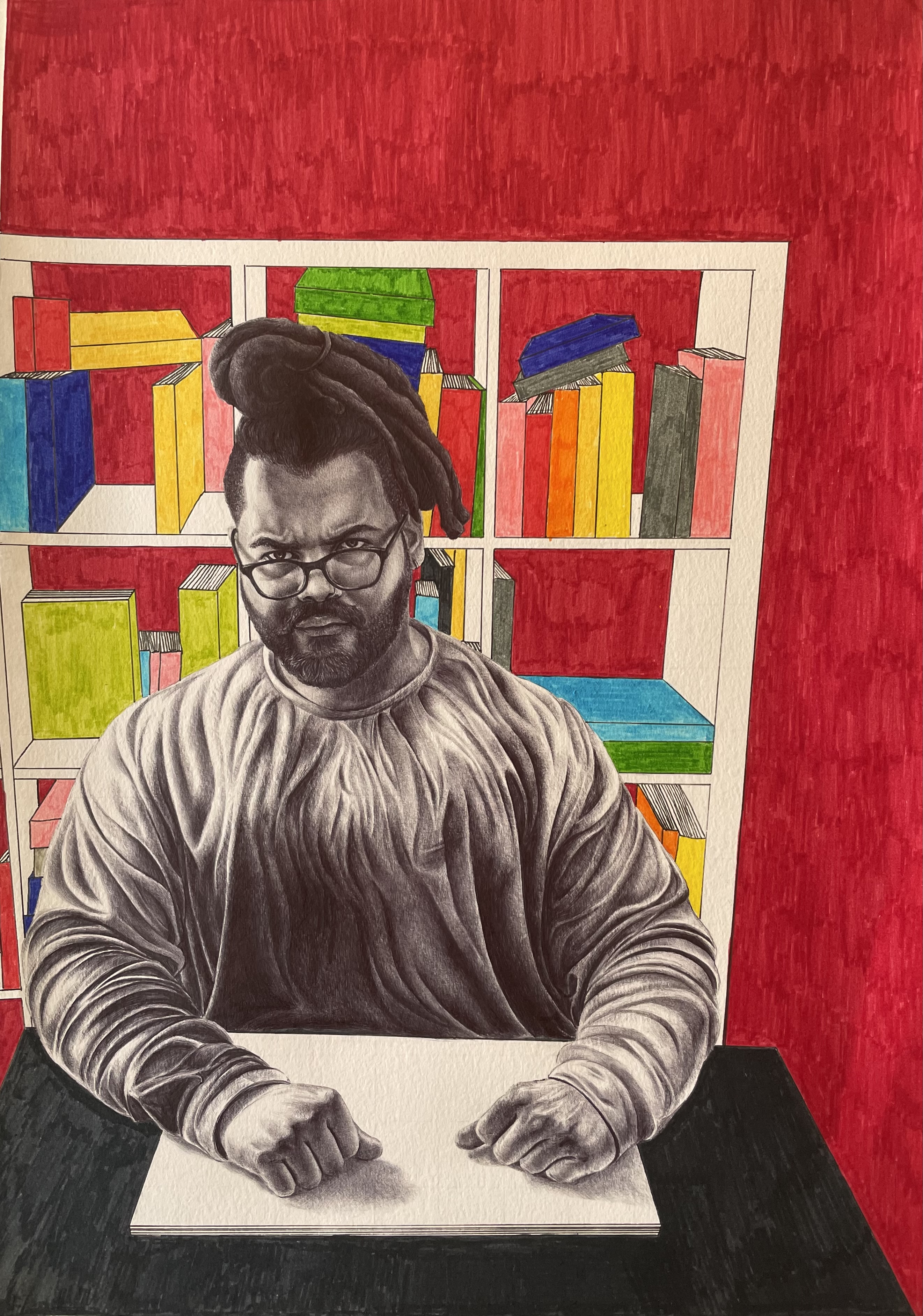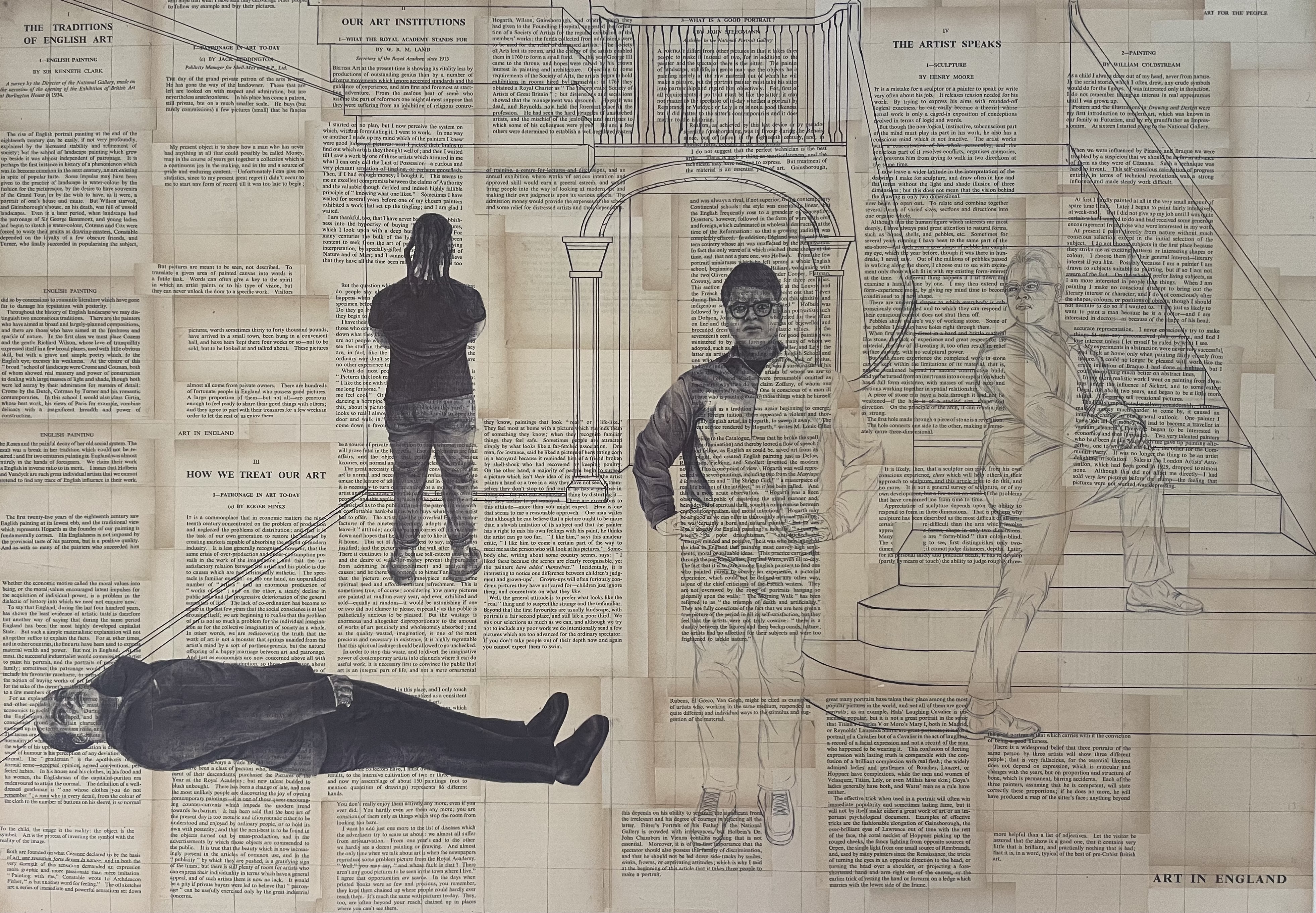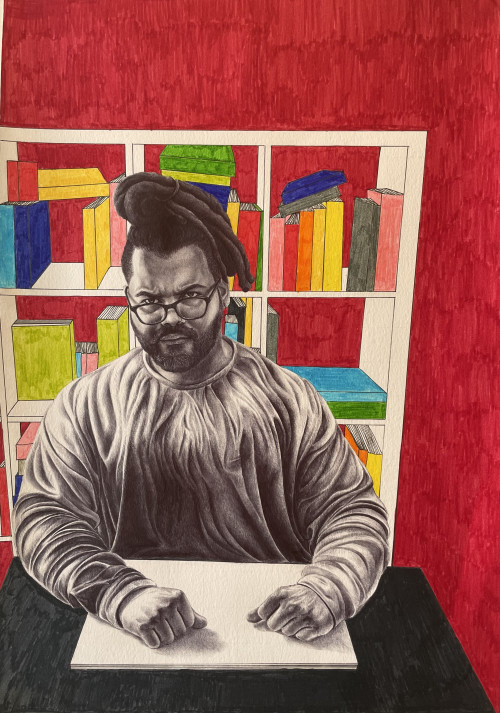
Habib Hajallie (b. 1995) is an elected member of The Royal Society of British Artists, the winner of The UK New Artist of The Year Award 2022 and was an honouree on Forbes’ prestigious 30 Under 30 list 2023. Hajallie looks to champion figures from ethnically diverse backgrounds that have conspicuously been omitted from traditional British portraiture. Through the exploration of identity within his ballpoint pen portraits; he looks to confront socio-political issues apropos to the perception of various demographics as being of lesser human value. Specifically, with minority groups often being further marginalised by mainstream media, reflecting an archaic hierarchy of status emblematic of colonial ideologies.

Hajallie strives to rectify the historic lack of visibility of figures from ethnic minority backgrounds. Therefore, questioning preconceived notions regarding what it means to be quintessentially British, as well as the uncomfortable nuances that are associated with this, is imperative for the artist. Though born in Southeast London, his drawings are often Informed by his Sierra Leonean and Lebanese heritage. By calling upon anecdotal references to portray scenes that are occasionally quasi-surrealist representations; the drawings look to confront lingering ethnocentrisms that are still embedded within modern western society.
Using antique texts & maps as canvases enables Hajallie to pragmatically re-contextualise ephemera, creating a cohesion between the concepts informing the work and the figures he depicts. As he empowers various figures; he simultaneously does so with the ground used, presenting them within new contexts. Placing himself or family members as the subjects of my portraits evokes a sense of immediacy, apropos to navigating the intersection of his western upbringing and familial West African culture.
Specialising in the use of a monochrome medium such as the black ballpoint pen to celebrate Blackness, allows Hajallie to somewhat paradoxically, show that there is more to an individual than just the colour of their skin. He builds layers of tone with delicate mark making methods through precise strokes of the everyday ballpoint pen as he looks to celebrate authentic drawing within the digital age.
Hajallie depicts motifs that challenge largely accepted revisionist narratives apropos to West African Histories, with semblances of antiquated ideologies at the root of nuanced prejudices that he has experienced. Ultimately, the work looks to catalyse a discourse and embolden individuals that feel as though they have been labelled as the ‘other’ in any manifestation.
Partner Reflection
Pallant House Gallery
Simon Martin, Director
Miriam O’Connor Perks, Assistant Curator
Working with Habib Hajallie as part of the 20/20 project has been an invaluable experience for Pallant House Gallery. This has been an opportunity for us to reflect on how our collections are formed. Collections are often signifiers of wealth, status and an individual’s taste. In addition, they can also demonstrate friendships between artists and collectors, which can be inspirational for forming relationships between artists and curators. We recognise how important it will be to leave communication open, checking in with artists, and collaborating beyond the end of the project. The programme has enabled the Gallery to deliver on proposed actions in our Anti-Racism Plan (formed in 2020) and deepen our commitment to diversifying our collection as set out in our Collections Development Policy, and to build on recent acquisitions of works by Barbara Walker, Somaya Critchlow, Lubaina Himid and Tunji Adeniyi-Jones, among others.
The Network Meetings have provided important points of reflection throughout the project, prompting us to make time to learn, as well as to discover what other artists and institutions are working on. The 20/20 project has had an impact on our exhibition programme, with a solo presentation of Hajallie’s work in the Print Room of the Gallery, as well as going into further strands of the public and digital programme, including an interview in the Gallery magazine, a talk and Instagram takeover. The Print Room is a dedicated space for showing works on paper (previous and future contemporary artist solo shows include Anne Desmet and Nana Shiomi), in close proximity to where Habib Hajallie’s research took place – the Library and Archive.
Habib Hajallie’s residency and subsequent exhibition works in parallel with other initiatives at the Gallery, which continue to reflect on the collection, and opens it up to different users. Examples include the co-curated exhibition with Sanctuary, a Chichester-based charity supporting refugees, which took place at the end of 2022. Other initiatives include working with contemporary artists to curate from the collection, for example Kaye Donachie in summer 2023 and Jake Grewal in autumn 2023.
We have had an all-team meeting to feed back on the project and to share reflections with other colleagues. Through archiving correspondence associated with the project, as well as gathering research resources on anti-racist curatorial practice, this will provide a legacy for the Gallery and for future staff. It can also provide a model for how we approach artist residencies in the future. The Large Collectors, as well as the portfolio of prints by artists in the 20/20 project, is the most significant legacy of the project, and we are considering displays for the future. Given the setting of Pallant House Gallery – an eighteenth-century townhouse showing modern and contemporary art – this provides an opportunity to think about displays which present alternative temporalities, and webs of inspiration and connection.
We need to work harder on the diversity of the workforce. Although Chichester is 97.4% white, there are many members of staff who commute, and so we need to continue to work on how and where we advertise opportunities. We need to make more time to properly research and reflect upon projects, having worked at reduced capacity until recently. Having now a full collections and exhibitions team, this presents an opportunity to develop curatorial strategies learned from and beyond the 20/20 programme, so it does not remain a discreet project. We are currently looking to review our interpretation guidelines, and auditing the collection, and so strategies learnt here will prove instrumental in these plans.
